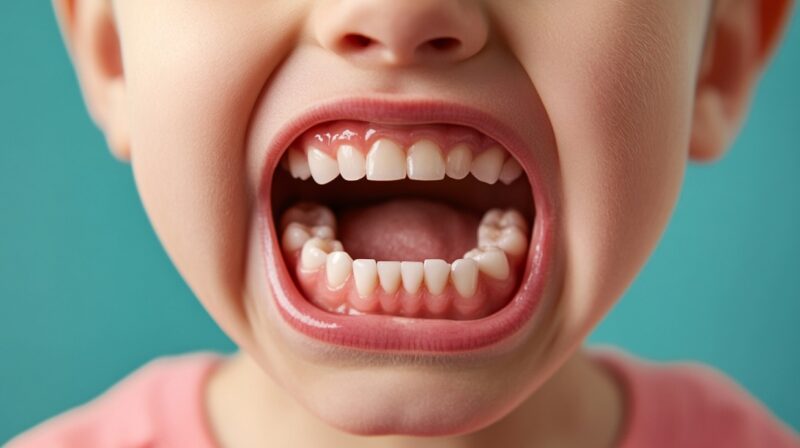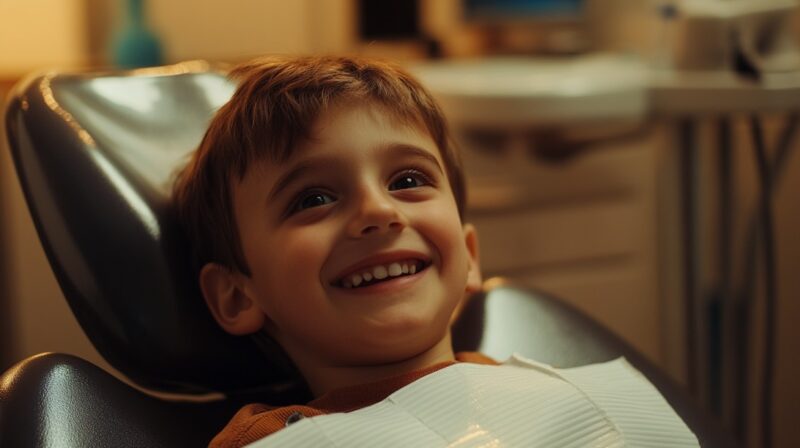Early dental care lays the groundwork for a lifetime of healthy smiles.
Parents often celebrate first steps or first words, yet that initial trip to the dentist goes unnoticed.
It’s more than just a routine check, it’s a chance to establish habits, ease fears, and catch issues before they grow.
Parents looking to safeguard their child’s oral health can benefit from knowing when that first visit should happen, why it matters, and how to prepare for it.
Let us talk about it in greater detail.
Recommended Age for First Dental Visit
First dental visits should be scheduled by age one or within six months after the appearance of the first tooth.
Many parents find this early timing unexpected, but those tiny baby teeth matter from the start.
Establishing dental care early helps children view appointments as routine rather than intimidating.
Consistent exposure builds trust with the dentist and normalizes oral care. Parents who act early give their children the best chance at a stress-free relationship with dental hygiene.

- Baby teeth can develop cavities soon after erupting.
- Early visits promote habit formation before problems begin.
- Smaller issues are easier and less expensive to address when caught early.
- Positive dental experiences early on help avoid future fear or resistance.
Routine visits shape how a child will approach oral health for years.
Why Early Dental Visits Matter
Tooth decay doesn’t wait for a child to grow up. Cavities can appear shortly after the first tooth, even by six months of age.
An early visit serves as a line of defense, giving both parents and children tools to prevent decay before it starts.
More than prevention, early visits help children form a comfortable relationship with dental care. When a child grows up seeing the dentist regularly, dental anxiety tends to stay low.
Parents, too, benefit by gaining expert insight into oral care routines and habits.
- Guidance on teething, brushing, and bottle use.
- Advice on pacifiers, thumb-sucking, and snack choices.
- Support in identifying and correcting habits that could affect oral development.
- Reduced likelihood of emergency visits due to untreated issues.
Confidence in dental care starts with that first appointment. Early exposure lays the groundwork for healthy routines and peace of mind.
Preparing for the First Visit

A child’s first dental appointment is a chance to lay a solid foundation for a lifetime of stress-free dental care.
Creating a smooth and successful experience takes thoughtful preparation on the part of both parent and child.
Choosing the right provider, knowing what to expect, and setting a positive tone are key elements in this process.
Choosing the Right Dentist
Finding a dentist who understands and works well with children is essential. Pediatric dentists receive additional training to focus exclusively on children’s oral health needs.
Practices like TannlegeTeam are examples of child-focused dental clinics that prioritize gentle care in a welcoming environment.
They create environments tailored to small patients, bright, colorful spaces filled with toys, books, and gentle encouragement.
Family dentists might offer general care for all ages, but often lack the specialized tools and techniques that help very young children feel at ease.
Picking a provider who makes your child feel safe and valued helps build confidence and prevents dental fear before it begins.
- Specialized pediatric training and certification
- Warm, child-focused atmosphere
- Age-appropriate dental instruments
- Staff experienced in handling toddlers and preschoolers
- Positive online reviews or referrals from trusted parents
Prepping Your Child
Children respond best when they know what to expect. Preparation should be fun, lighthearted, and confidence-building.
Avoid surprise appointments or vague descriptions. Turn the visit into a familiar story they can picture clearly in their minds.
Books and shows about going to the dentist often feature favorite characters and simple narratives that help reduce nervousness.
Engaging in role-playing games where a child gets to pretend to be the dentist can turn the process into a game instead of a challenge.
- Use cheerful, non-threatening language like “tooth counting” or “smile check”
- Read books or watch cartoons about first dental visits
- Let your child practice sitting in a reclined chair at home
- Schedule appointments during calm times (e.g., after naps or meals)
- Allow them to bring a favorite toy or blanket for comfort
Prepping Yourself
Children pick up on tone, body language, and emotions.
Parents who are visibly nervous or talk negatively about past dental experiences can unintentionally transfer those feelings to their child.
Remaining upbeat and composed sets the example for how to feel during the appointment.
Planning helps reduce your stress. Dentists often ask about feeding habits, thumb-sucking, or brushing routines, so it’s helpful to have those answers ready.
Jotting down questions beforehand ensures you get the information needed without scrambling during the visit.
- Speak positively about dentists in front of your child
- Keep anxious thoughts and negative stories to yourself
- Gather your child’s medical history and any medication details
- Write down specific concerns or behaviors to discuss
- Stay calm and reassuring before, during, and after the visit
What to Expect During the Visit

First dental appointments are less about treatment and more about creating comfort, routine, and trust.
Children are introduced to the sights and sounds of a dental setting calmly and positively.
For parents, it’s an opportunity to observe how their child reacts, ask questions, and receive tailored advice.
- The visit usually lasts between 30 and 45 minutes, keeping it short enough to hold a young child’s attention.
- A pediatric dentist inspects the child’s teeth, gums, bite, and jaw development. They check for signs of decay, misalignment, or unusual growth patterns.
- Any abnormalities or early symptoms of cavities are noted. This stage focuses on spotting potential concerns before they require more complex care.
- A soft polish may be done using gentle instruments. It introduces children to the idea of professional cleaning without discomfort.
- Dentists often use this time to show both children and parents how to brush properly, offering age-appropriate hygiene tips.
- Fluoride application or X-rays are discussed only if the child’s age or oral health history justifies them.
- Parents may sit in the chair or stay close to help their child feel secure, transforming the appointment into a collaborative learning moment.
Familiarity begins here. A peaceful introduction can set a child on a path of positive dental habits for life.
Signs a Child Might Need an Earlier Visit
Sometimes, signs emerge that shouldn’t wait for the standard age-one visit. Parents who pay close attention to their child’s mouth can often catch issues early.
Prompt action can ease pain, reduce long-term costs, and help avoid more invasive treatments.

- Inflammation or unexpected bleeding during brushing could point to infection or improper hygiene practices.
- Complaints of discomfort when chewing may signal cavities or gum sensitivity.
- Dark spots, chalky areas, or yellowing can indicate enamel breakdown or early decay.
- Any sign of injury or trauma, even if minor, should be checked.
- Premature movement of teeth might reflect underlying developmental issues.
- Extensive teeth grinding could cause bigger problems
Acting quickly helps protect a child’s comfort and ensures healthy development continues without interruption.
Regular observation and swift action build a strong foundation for oral wellness.
Final Thoughts
Children deserve a strong foundation for oral health, and that starts earlier than many realize. The first visit to the dentist is a quiet milestone that can influence habits and attitudes for years.
Scheduling that first appointment, choosing a supportive professional, and preparing as a team all contribute to a smooth experience.
Parents who treat the visit as a normal and positive part of development help their child feel safe, confident, and ready to smile.

